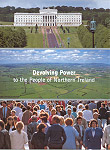
Devolved Government in Northern Ireland[Key_Events] [KEY_ISSUES] [Conflict_Background] POLITICS: [Menu] [Reading] [Articles] [GOVERNMENT] [Political_Initiatives] [Political_Solutions] [Parties] [Elections] [Polls] [Sources] [Peace_Process] Material is added to this site on a regular basis - information on this page may change
Suspensions resulting in the reimposition of Direct Rule:
The 'Virtual Assembley':
Restoration of Devolved Government in 2007
See also:
Under the legislation certain powers were not devolved from Westminster to devolved governments at Stormont and the Secretary of State for Northern Ireland held responsibility for these matters. Initially the Secretary of State retained control over: policing, security policy, prisons, criminal justice, international relations, taxation, national insurance, regulation of financial services, and the regulation of telecommunications and broadcasting. A latter agreement in 2010 resulted in the powers related to security and justice being returned to Stormont control.
The 108 member Northern Ireland Assembly meets in Parliament Buildings at Stormont, Belfast. The Assembly has the power to make laws and take decisions on all matters that have been devolved from Westminster.
The Northern Ireland Assembly elects an Executive Committee which is the equivalent of the British Cabinet. The Executive is made up of the First Minister, the Deputy First Minister, two junior ministers and the Ministers who head the government departments.
Initially ten government Departments were established to administer government responsibility for those matters that were devolved from Westminster. The Departments manage budgets and administer policy for social and economic matters.
For each of the Departments there is a matching Statutory Committee. The role of the Committee is to scrutinise the administration of the Department and the relevant Minister, to advise on policy development, and to help in the initiation of legislation.
The North-South Ministerial Council comprises Ministers from the Northern Ireland Assembly and the Irish Government. The aim of the Council is to develop consultation, co-operation, and implementation, on matters of mutual interest to the two states. Decisions on policy are implemented through the North-South Implementation Bodies. North-South Implementation Bodies Initially there were six North-South Implementation Bodies established as part of the Good Friday Agreement to deal with policy matters decided by the North-South Ministerial Council.
The British-Irish Council is a counterpart of the North-South Ministerial Council. The British-Irish Council is made up of representatives of: the British government, the Irish government, the Northern Ireland Assembly, the Welsh Assembly, the Scottish Parliament, and the institutions of the Isle of Man and the Channel Islands. The aim of the Council is to promote the development of harmonious relationships between the various governments, assemblies, and institutions.
The British-Irish Intergovernmental Conference was designed to replace the Anglo-Irish Intergovernmental Council and the Intergovernmental Conference both of which were established as a result of the Anglo-Irish Agreement in November 1985.
The Civic Forum (2000-2002) was comprised of 60 members representing all walks of life in Northern Ireland. The Forum acted as a consultative mechanism on social, economic and cultural matters.
| |||||||||||||||||||||||||||
CAIN
contains information and source material on the conflict
and politics in Northern Ireland. CAIN is based within Ulster University. |
|
|
|||
|
Last modified :
|
||
|
| ||
